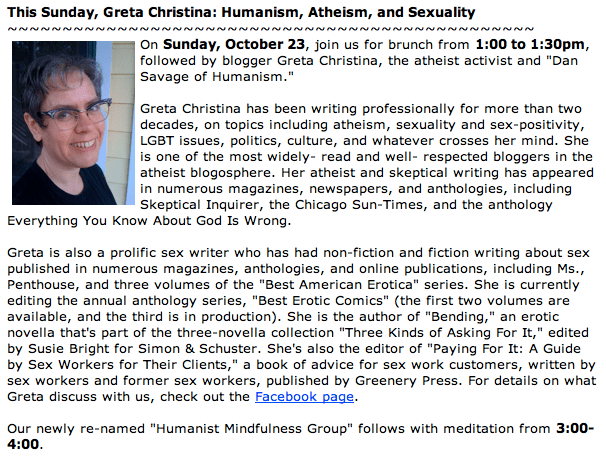
My Humanist Years
I was raised Catholic, but one night in my freshman year of college I lay down on my bed, thought about it for a minute, and decided I didn’t believe in God any more. That was that.
When I started grad school at Harvard four years later, I was ready to check the “none” box on the religious preference form until I saw the last box above “none”: “Secular Humanism.” That sounded good, so I checked that. A few days later, I got a call from Tom Ferrick, Harvard’s Humanist chaplain.
Note the capital H. To be a “humanist” might mean to be a scholar of the humanities, or to be generally concerned with human welfare, but to be a Humanist is to be a supporter of one of one of the multiple organizations espousing and promoting a pro-human ethical stance typically, though not necessarily, exclusive of a belief in a higher power.
The general idea is that being an atheist (or an agnostic, or whatever) doesn’t necessarily mean being an asshole. Partisans of Humanism generally argue that (a) contrary to what many (though not all) religious believers assert, there are sound reasons to behave with charity and compassion towards one’s fellow humans even if one doesn’t fear divine retribution and that (b) organized religion is a force for harm as well as good—quite possibly more harm than good. As an organized group, Humanists support one another and provide handy services like atheist chaplains for your wedding as well as lobbying for the separation of church and state, and raising awareness about the healthiness of a non-God lifestyle.
This was all explained to me by Tom, who was not just Harvard’s first Humanist chaplain but in fact the first officially recognized Humanist chaplain on any college campus, anywhere. His office was in the basement of Memorial Church, where he shared space with all the other college chaplains whose denominations weren’t big or wealthy enough to build their own on-campus ministerial facilities. Tom started his ministerial career as a Catholic priest, but found that he could not in good conscience advise members of his flock to follow Catholic orders like the mandate to forsake birth control and the order to, um, not be gay. Tom was accepted to Harvard’s United Ministry in 1974.
I started having lunch with Tom every month or so—both because I was fascinated by his life story and because I was curious about Humanism. I joined the Humanist Association of Massachusetts and started attending lectures Tom organized by prominent Humanists and Humanist sympathizers; I was among a group of students who lunched with the writer Christopher Hitchens before a lecture he delivered, and mostly remember being awed by the number of cocktails Hitchens downed before delivering a perfectly lucid, cutting speech. I contributed a few articles to the HAM (yes, that would be the acronym) newsletter, which landed me a mention in the book Who’s Who in Hell; a piece I wrote about the composer Béla Bartók is cited as proof that Bartók had secular leanings.
My interest in Humanism worried my family, who had nurtured (some of whom still nurture) a hope that I’d return to the Catholic Church. This felt suspiciously like falling in with another faith. “Do you go to Humanist church?” was a question I was often asked. Nope, just lectures.
Over time, though, I lost interest in Humanism. I felt pretty confident in my own personal philosophy, and I became tired of hanging out with cranky old Cantabridgians who would pepper anyone at any opportunity with questions and/or declarations (sometimes it was hard to tell the difference) about the evils of organized religion. Though humanism in theory was a positive philosophy about making a difference in the world, Humanism in practice seemed to be a lot of carping about people of faith, which didn’t seem to be helping anyone. Isn’t the point of Humanism supposed to be proving that atheists aren’t assholes? Those assholes were blowing it, royally.
Tom himself was never so negative. He took justifiable pride in having provided a generation of atheist and agnostic students with a way to say that in matters of faith and ethics, they stood not just against religion, but for a humane, progressive way of life. Tom ultimately retired, ceding his post to the incredibly energetic secular rabbi (yeah, I don’t really get it either) Greg Epstein, who immediately embarked on an enormously successful campaign to raise money and publicity for Harvard’s Humanist Chaplaincy. With his book Good Without God, Epstein caught the wave of atheist books by people like Hitchens (God is Not Great) and Richard Dawkins (The God Delusion) and has become an advocate for a “new Humanism” that is less stridently anti-religious.
Sounds like a good idea to me, but I’m still not ready to sign up as a card-carrying Humanist; I’m content to be a (relatively) quiet non-believer. I’m still on Epstein’s mailing list, though, and I follow his Humanist exploits from afar. Here’s an excerpt from the latest Harvard Humanist newsletter.
A talk by a sex-minded atheist, followed by mindfully godless meditation? I guess that’s what my family might call “Humanist church.” No kneeling, just Bending. And no guilt. Amen, sister!

